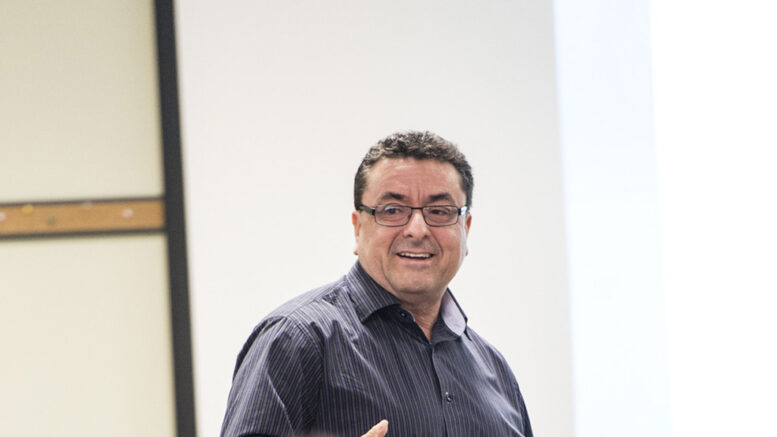By Jeremy Appel, Local Journalism Initiative Reporter
(ANNews) – Métis lawyer Troy Chalifoux used to work for the Government of Canada negotiating with First Nations. Now he directly represents First Nations in private practice as senior counsel for Maurice Law, Canada’s first and only Indigenous-owned national law firm.
Although he was technically switching sides in court from defendant to plaintiff, Chalifoux never took an “adversarial approach to negotiations” with First Nations, preferring to treat them as partners instead.
“Making the transition from working for the government to working for First Nations is pretty easy, because working for the government, I always felt I was working for First Nations,” he explained.
“The difference is now I’m not working for them with one hand tied behind my back.”
During his career in government – working first for the Ministry of Justice and then for Indigenous Services Canada—Chalifoux played a key role in negotiating the 2018 Lubicon Cree land claims settlement.
The agreement was the culmination of more than a century from the First Nation to obtain its Treaty rights.
Located near Peace River, the Lubicon Cree, also known as the Lubicon Lake Band, were excluded from the original Treaty 8 agreement in 1899.
In 1933, the First Nation’s members initiated a land claim. By the end of the decade, the federal government recognized the Lubicon Cree as a distinct nation and promised its members a reserve, but the government didn’t keep its word, owing to the vast oil and gas reserves discovered on the band’s land.
Chalifoux credited the First Nation with running a successful campaign coinciding with the 1988 Olympics in Calgary to bring international attention to its plight, which impacted him as a government lawyer.
“I just woke up. Their perspective was that Canada and Alberta were oppressing them, exploiting their lands and refusing to negotiate,” Chalifoux told Alberta Native News.
The agreement between the Lubicon Lake Band, federal government and provincial government gave the First Nation 95 square miles of land, as well as $95 million compensation from the federal government and $18 million from the provincial government.
“I think I stayed in government as long as I did because I just wanted to see that deal done and I was confident that a different approach would be successful.”
But Chalifoux wasn’t just responsible for the Lubicon file. “I had a hand in almost every treaty land entitlement in Alberta,” he said.
While Chalifoux eventually grew tired of working for the government, he wasn’t done fighting for Treaty rights. “I just felt I had too much experience to let it go to waste and went to the other side,” he explained.
Picking up where he left off in government, Chalifoux works with Michel Band and the Papaschase Band—two First Nations engaged in efforts to obtain their Treaty rights.
“The two files are different, but similar,” he explained. “Michel is on a path negotiating with Canada to regain their status as a band. Papaschase has been and continues to try to get Canada to recognize them as a band as well, but is not as far along the process as Michel is.”
The Michel Band, which was a Treaty 6 signatory, was disbanded in 1958 by Prime Minister John Diefenbaker through enfranchisement. This process culminated in stripping all its members except for four women and a child of Treaty First Nation status and having its reserve, which was located near St. Albert, surrendered.
Descendants of Michel Band, as previously reported by this outlet, have formed the Michel Callihoo Nation Society in an effort to obtain federal recognition for a new band, Michel Callihoo Nation.
In Papaschase’s case, the Treaty 6 First Nation was absorbed into nearby nations in 1888 after three of its 249 members decided to do so. According to Chalifoux, there are more than 1,000 Papaschase descendants.
Despite not having recognition from the Crown, the band has had an elected chief and council since 1999.
Chalifoux called Papaschase’s story “profoundly sad, bordering on tragic, because Canada used all of its tools available to them to basically strip Papaschase of their status, of their lands, essentially their right to exist, and now uses their own rules to prevent reconciliation.”
Papaschase was “making some headway” with the former prime minister Justin Trudeau’s government, he added, but there’s a lack of clarity with a new prime minister and impending federal election.
Papaschase and Michel both had their original reserves on some of the “most valuable and fertile agricultural land in the West,” Chalifoux said, but were robbed of their lands due “a series of questionable transactions, orchestrated by Frank Oliver.”
Oliver, publisher of the Edmonton Bulletin newspaper and a Liberal MP, was a staunch proponent of dispossessing Indigenous Peoples.
Edmonton’s largest neighbourhood, now known as Wîhkwêntôwin, used to be named after him.
Chalifoux said he wants to obtain justice for the “tragedies that were perpetrated on these weak nations by Canada.”
“Canada stripped them of their right to exist, which is the Treaty right, but to now have to jump through the very hoops that Canada creates in order for there to be reconciliation, to me, is the ultimate insult to the injury,” he said.



Be the first to comment on "From government negotiator to representing First Nations directly"